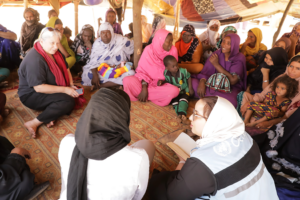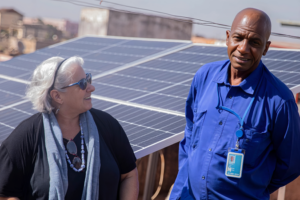American Amy Martin on Two Decades of Humanitarian Work
“People here want to carry on with getting back to work, getting back into schools, getting back health services they rely on for their families. That’s my motivation and what keeps us going: being optimistic that together we can always find solutions.”
 American Amy Martin has been a humanitarian for more than two decades—still driven by the same sense of purpose that led her to Mali as a Peace Corps volunteer when she began her career. Now the Head of Office for the United Nations Office for the Coordination of Humanitarian Affairs (OCHA) in Mali—what she describes as a “full circle moment”—she continues to bring her wisdom and commitment to service into one of the world’s most complex emergencies.
American Amy Martin has been a humanitarian for more than two decades—still driven by the same sense of purpose that led her to Mali as a Peace Corps volunteer when she began her career. Now the Head of Office for the United Nations Office for the Coordination of Humanitarian Affairs (OCHA) in Mali—what she describes as a “full circle moment”—she continues to bring her wisdom and commitment to service into one of the world’s most complex emergencies.
“I came from a family of civil servants… having that motivation to serve has always been there,” the Virginia native remarks.
After graduating from university, Martin joined the Peace Corps. “I went overseas to see if rural development, community development, international development was work that I wanted to pursue,” she explains.
Turns out, the experience ignited a spark.
From Mali, she travelled the globe. “My first assignment with OCHA was in Darfur, Sudan in 2005,” she recalls. “I’ve worked in Ethiopia, Myanmar—specifically in Rakhine State during the Rohingya crisis—Central African Republic, Cote d’Ivoire and Haiti after the 2010 earthquake.” Each setting brought new challenges and reaffirmed her dedication to the job.
“I’ve seen a lot of hardship in both natural disaster and complex settings,” Martin admits, but the people she serves are what keep her going. “I’ve seen the resilience of the people and their optimism. Last year we had huge floods here in Mali that caused a lot of displacement, but everyone remained hopeful.”
Martin has been especially proud of using her role at OCHA to function as a bridge—one that connects affected communities with those working to help. “The United Nations brings all the countries together and OCHA brings all humanitarian partners together,” she says. “OCHA is the convener, the enabler. We bring all the different elements together to see how we can help restore, rebuild and help populations become more resilient to face shocks in the future.”
“The United Nations brings all the countries together, and OCHA brings all humanitarian partners together. It’s the convener, the enabler.”
She was quick to emphasize that humanitarian work is never about creating dependency, but enabling recovery. “Technically, we are temporary,” Martin underscores. “We are here to help support the community for a short time and then the community will find solutions for themselves and have that capacity to move forward.”
 One of the most powerful parts of the job, she says, is seeing humanitarians come together in crisis. She recalls a moment in the Central African Republic where violence was on the brink of real catastrophe. “Through our coordination, we were able to come together to prevent those attacks from happening,” she says. “The UN, NGOs, even the Bishop in the community—we all worked together to keep people safe while we mobilized security forces to serve as a buffer.”
One of the most powerful parts of the job, she says, is seeing humanitarians come together in crisis. She recalls a moment in the Central African Republic where violence was on the brink of real catastrophe. “Through our coordination, we were able to come together to prevent those attacks from happening,” she says. “The UN, NGOs, even the Bishop in the community—we all worked together to keep people safe while we mobilized security forces to serve as a buffer.”
Martin saw it again in Darfur, where emergency teams mobilized rapidly after attacks on villages. “We had a solid team going out there assessing needs very quickly, and assistance rolling out the next day.”
In recent years, however, the humanitarian space has come under increasing pressure. Funding is dwindling at a time when organizations are already stretched thin.
“Unfortunately, yes, there is an impact,” Martin says when asked about funding challenges. “We are seeing organizations having to suspend activities, close their doors and leave communities altogether. And that impact will be felt for the medium and longer term.”
Still, she remains focused on solutions. “It’s going to push us to work together to see what we can prioritize as a humanitarian community,” she explains. “And how we communicate that to communities—because this goes to our acceptance and the trust between communities and humanitarian programming here in Mali.”
But even with all the practical challenges, what really concerns Martin cuts much deeper: the erosion of empathy and the rise of polarization.
“What worries me the most globally is less tolerance and the dehumanization that must be there to allow atrocities to continue—whether in Darfur, Sudan or in other parts of the world,” she reflects. “How do we swing the dial back to having a more tolerant community? To mutually respect our fellow human beings?”
For her, this is not just a question for humanitarians but for all of us. And as someone from a donor country, she’s quick to point out that international cooperation is in everyone’s interest.
“We are in a global society. The economic wellbeing of every country benefits each other,” Martin says. “The wellbeing of our neighbors is also our own wellbeing. I don’t think we can ever live in isolation. So for me, the dollars that are spent in humanitarian assistance enable peace, development and economic benefit for people in the United States.”
“The wellbeing of our neighbors is also our own wellbeing. I don’t think we can ever live in isolation. So for me, the dollars that are spent in humanitarian assistance enable peace, development and economic benefit for people in the United States.”
After two decades in the field, Amy Martin is still driven by the same force that started her on this path: a belief in service, in connection and in the possibility of building a better future together.
“We’re all here together,” she says, “and together we can have a better world for ourselves, for our families, for our communities.”